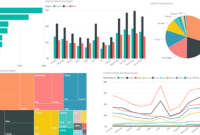BI software for enterprises is a game-changer in the business world, revolutionizing data analytics and decision-making processes. Dive into the realm of BI solutions tailored for enterprises and unlock the power of insightful data analysis.
Explore the key components, customization options, scalability features, and security measures that make BI software indispensable for modern enterprises.
Introduction to BI Software for Enterprises

BI software, or Business Intelligence software, plays a crucial role in helping businesses make informed decisions by analyzing and visualizing their data. Enterprises rely on specialized BI software to gain insights into their operations, identify trends, and improve overall performance.
Key Features and Benefits of BI Software for Enterprises
- Advanced Analytics: BI software offers advanced analytics capabilities, allowing enterprises to perform complex data analysis and forecasting.
- Data Visualization: Enterprises can create interactive dashboards and reports to present data in a visually appealing and easy-to-understand manner.
- Real-time Reporting: BI software enables enterprises to access real-time data, providing up-to-date insights for timely decision-making.
- Self-Service BI: Users across the organization can create their own reports and dashboards without relying on IT, increasing efficiency and agility.
Examples of Well-known BI Software Solutions
- Tableau: Tableau is a popular BI software used by enterprises for data visualization and analytics, offering a user-friendly interface and powerful features.
- Microsoft Power BI: Microsoft Power BI is another widely used BI tool that integrates with Microsoft products and provides robust analytics capabilities.
- SAP BusinessObjects: SAP BusinessObjects is a comprehensive BI platform that offers a wide range of tools for reporting, analysis, and data visualization.
Key Components of BI Software for Enterprises

BI software designed for enterprises encompasses several crucial components that enable organizations to effectively harness their data for informed decision-making.
Data Integration and Data Analysis Tools
Data integration tools within BI software allow enterprises to consolidate data from various sources, such as databases, applications, and cloud services. These tools help in transforming raw data into a format that is suitable for analysis. On the other hand, data analysis tools enable organizations to delve deeper into their data, uncovering trends, patterns, and insights that can drive strategic decisions.
Data Visualization
Data visualization plays a pivotal role in helping enterprises interpret complex data sets through visual representations like charts, graphs, and dashboards. By presenting data in a visually engaging manner, organizations can quickly grasp key insights, trends, and outliers, facilitating faster and more informed decision-making.
Real-Time Data Access and Reporting Capabilities, BI software for enterprises
Real-time data access and reporting capabilities are essential for enterprises to stay agile and responsive in today’s fast-paced business environment. With the ability to access and analyze real-time data, organizations can make timely decisions based on the most up-to-date information available. Reporting functionalities further enable enterprises to generate customized reports and share insights across departments, fostering collaboration and alignment towards common business goals.
Customization and Scalability in BI Software
Customization and scalability are essential aspects of BI software for enterprises, allowing them to tailor their analytics tools to meet specific needs and accommodate growth. Let’s delve into the importance of customizable dashboards and scalability in choosing BI software for enterprises.
Customizable Dashboards for Enterprises
Customizable dashboards play a crucial role in enabling enterprises to visualize data in a way that is most relevant to their operations. By allowing users to customize the layout, metrics, and visualizations on their dashboards, BI software empowers organizations to focus on the key performance indicators (KPIs) that matter most to them. For example, a sales team may choose to prioritize revenue metrics, while a marketing team may emphasize customer engagement data. The ability to customize dashboards ensures that each department can access the insights that are most valuable to their specific goals and objectives.
Scalability in BI Software
Scalability is a critical factor to consider when selecting BI software for enterprises, especially for growing organizations. As companies expand and generate more data, their analytics tools need to be able to handle increasing volumes of information without sacrificing performance. Scalable BI software can grow alongside the business, seamlessly accommodating additional users, data sources, and analytical capabilities. This flexibility ensures that enterprises can continue to derive valuable insights from their data as they evolve and expand.
Tailoring BI Software to Meet Enterprise Needs
BI software can be customized to meet specific enterprise needs through various means, such as creating custom reports, integrating with existing systems, or developing tailored analytics solutions. For instance, a manufacturing company may require BI software that can analyze production line efficiency in real-time, while a retail business may need tools to forecast inventory demands accurately. By tailoring BI software to address these unique requirements, enterprises can optimize their operations, improve decision-making, and gain a competitive edge in their industry.
Benefits of Cloud-Based BI Solutions
Cloud-based BI solutions offer scalability and flexibility to enterprises by providing on-demand access to analytics tools and resources. With cloud-based BI software, organizations can easily scale their analytics capabilities according to their changing needs without the need for significant upfront investments in infrastructure. Additionally, cloud-based solutions offer enhanced data security, real-time collaboration features, and seamless integration with other cloud services. This agility and adaptability make cloud-based BI solutions an attractive option for enterprises looking to scale their analytics operations efficiently.
Security and Compliance Features in BI Software

When it comes to handling sensitive enterprise data, security and compliance are crucial aspects that BI software must address. Let’s delve into the security measures and compliance features that BI software offers to protect enterprise data and ensure adherence to industry regulations.
Data Protection and Security Measures
- Encryption: BI software often utilizes encryption techniques to secure data both at rest and in transit. This ensures that unauthorized users cannot access sensitive information.
- Access Control: Implementing robust access control mechanisms allows organizations to regulate who can view, edit, or delete data within the BI software platform.
Compliance Features for Regulatory Adherence
- Audit Trails: BI software maintains detailed audit trails that track all data access and modification activities. This feature helps organizations demonstrate compliance with industry regulations.
- Role-Based Permissions: By assigning role-based permissions, BI software ensures that users only have access to the data and features necessary for their specific role within the organization.
Data Governance and Integrity
- Data Quality Controls: BI software offers tools to monitor and maintain data quality, ensuring that accurate and reliable information is used for decision-making processes.
- Data Lineage: Tracking data lineage helps organizations understand the origin and movement of data within the system, supporting data governance initiatives.
Examples of Encryption and Access Control
-
End-to-End Encryption: BI software may employ end-to-end encryption to protect data from unauthorized access during transmission.
-
Role-Based Access Control: Organizations can define user roles and set permissions based on job responsibilities, restricting access to sensitive data.
In conclusion, BI software for enterprises offers a dynamic approach to data management, empowering businesses to thrive in a data-driven environment. With its customizable dashboards, real-time insights, and robust security features, BI software paves the way for informed decision-making and sustainable growth.
When it comes to analyzing data and making informed decisions, interactive dashboards play a crucial role. These dynamic tools allow users to explore data visually and gain valuable insights quickly. By utilizing interactive dashboards , businesses can track key performance indicators, identify trends, and make data-driven decisions efficiently.
A BI data warehouse serves as a central repository for all the business data, enabling organizations to store, manage, and analyze vast amounts of information effectively. By implementing a robust BI data warehouse , companies can streamline their reporting processes, improve data accuracy, and enhance overall decision-making capabilities.
For large enterprises, implementing a comprehensive BI strategy is essential for staying competitive in today’s market. BI for enterprises empowers organizations to leverage their data assets, gain a deeper understanding of their operations, and drive strategic initiatives based on actionable insights.




